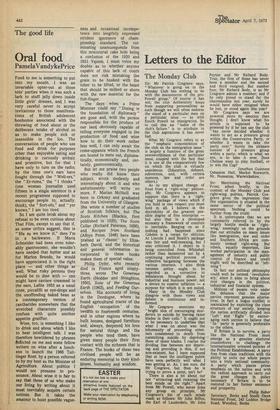The good life
Oral food
PamelaVandykePrice
Food to me is something to put into my mouth. I was an invariable opter-out at those tots' parties when it was such a lark to stuff jelly down inside little girls' dresses, and I was very careful never to accept invitations to those manifestations of British adolescent bonhomie associated with the throwing of food about or the deliberate intake of alcohol so as to make people sick or insensible in the loo. The conversation of people who use food and drink for purposes other than enjoyable eating and drinking is curiously archaic and primitive, but for that I have only to turn on the radio; by the time one's ears have fought through the " Well-ers," the " Er-rums," the " I thinks " (one woman journalist used fifteen in a single sentence in a recent programme supposed to encourage people to, actually, think), the " Sort-of s," and " yer knows," I am too tired.
So I am quite brisk about my refusal to be even curious about That Film, except to say that if, as some critics suggest, this is "life as we know it," then I'm in a backwater. If Maria Schneider had been even tolerably gastronomic, she wouldn't have needed that butter and as for Marlon Brando, he would have appreciated it in the right place — and other things as well. What risky persons they would be to dine with — one might have caviare crammed in the ears, Lafite 1953 as a nasal rinse, piccalilli as eye-drops and the unoffending baked bean as a contemporary version of cantharides somewhere that the wretched characters possibly confuse with quite another appetite gratifier.
Wine, tco, is something I like to drink and about which I like to hear intelligent talk. I was therefore bewildered by phrases inflicted on me and some fellow writers on wine after a luncheon to launch the 1966 Taittinger Rosé, by a person referred to by my host as the Minister of Agriculture. About politics I would not presume to pronounce. About wine it is fair to say that those of us who make our living by writing about it must inevitably acquire certain notions. But it takes the amateur to hoist possible vague ness and occasional incompetence into lengthily expressed strident ignorance of championship standard. The culminating unamusegueule from this ministerial cake hole being a confusion of the 1920 and 1921 Yquem, I must voice my doubts as to whether anyone capable of this lack of couth does not risk mistaking the grain to be husked with the tuber to be lifted, or the beast that should be milked or shorn with the raw material for the fish-finger.
The days when a Prime Minister could say "Dining is the foundation of diplomacy" are gone and, with the person responsible for the produce of our land, obviously capable of telling everyone engaged in the production of food and wine how to do their work rather less well, I can only await the come-uppance which the French are bound to mete out, diplomatically, economically and, certainly, gastronomically.
But let me praise two people who really did know their subject, wrote modestly and interestingly about it and who unfortunately will write no more. F. Marian McNeill was born in Orkney and graduated from the University of Glasgow.
She wrote a number of studies of Scottish folklore, but The Scots Kitchen (Blackie, first published in 1929), The Scots Cellar (Richard Paterson, 1956), and Recipes from Scotland (Albyn Press, 1946) have been praised as ' classic ' by Elizabeth David, •and the historical and general information incorporated in these books makes them of special value.
Philip Oyler, who recently died in France aged ninety three, wrote The Generous Earth (Hodder and Stoughton, 1950), Sons of the Generous Earth (1963), and Feeding Our selves. His accounts of living in the Dordogne, where he found agricultural traces of the English ' occupation' of the twelfth to fourteenth centuries.
and in other regions where he built houses, designed furniture and, always, deepened his love for natural things and the people who tend them, have given many people their first contact with the richness that is France. The books of these two civilised people will be an enduring memorial to their kindliness, humanity and wisdom.


































 Previous page
Previous page